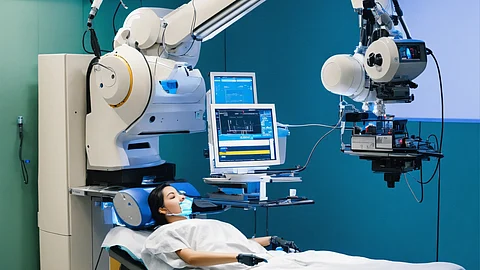North India has witnessed history being born in medicine, with the first robotic breast cancer surgery being performed recently at Indraprastha Apollo Hospital in Delhi. The 37-year-old woman, having a long history of recurrent breast cancer and carrying a BRCA gene mutation, was treated through this novel method as a preventive and reconstructive measure.
High-Risk History Prompted Advanced Surgical Strategy
Diagnosed with triple-negative breast cancer in 2017, the patient had endured decades of aggressive treatment, chemotherapy, radiotherapy, multiple lumpectomies, and a salpingo-oophorectomy. As a BRCA-positive, her risk of recurrence was significantly higher.
To manage this risk beforehand, the surgical team proposed bilateral breast surgery that combined robotic advanced technology with reconstructive techniques. This tailored approach shows a fine balance between innovation and patient protection.
The multidisciplinary team combines technology and compassion.
A panel of experts led the complex operation:
Dr. Ramesh Sarin, Senior Consultant, Surgical Oncology
Dr. Arun Prasad, Senior Consultant, Robotic Surgery
Dr. Prag Sharma, Dr. Jayanti Tamsi, and Dr. Sandeep Bapte
They performed a nipple-sparing mastectomy on the right breast using the da Vinci robotic surgical system. The left, which was irradiated and had received lumpectomies, was reconstructed with an implant and musculocutaneous flap after a standard mastectomy.
Robotic accuracy reduces trauma and accelerates recovery.
According to the hospital, robotic assistance greatly improved surgical precision, reduced trauma, and helped preserve surrounding healthy tissue. The patient recovered quickly and was discharged in stable condition.


